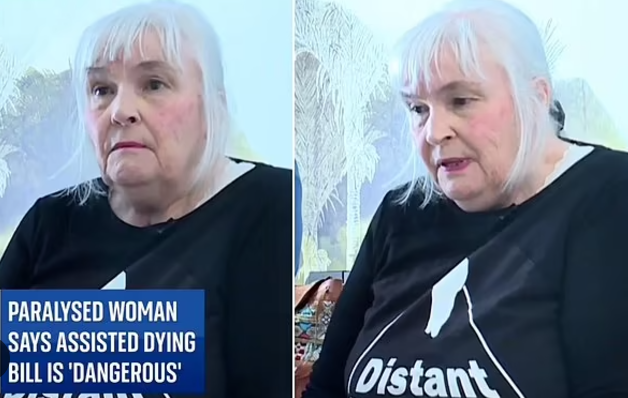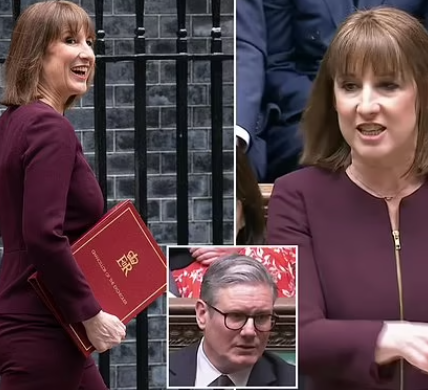Paralysed pensioner says assisted dying bill is ‘not safe’ – as MPs vote in favour of new laws amid dark warnings of a ‘state suicide service’ and questions about how NHS will cope_Nhy
A paralysed pensioner has said the assisted dying bill is ‘not safe’, as she urged people to listen to ‘common sense’ and to not go through with it.
It comes after MPs voted in favour of an assisted dying law yesterday in a historic motion, despite dark warnings it would lead to a ‘state suicide service’.
Nicki Kenward, 71, who was formerly a theatre manager and performing arts teacher, is a passionate campaigner against assisted suicide.
Speaking to Sky News yesterday Ms Kenward said: ‘It’s not safe. Say no, it’s not safe. By the work we’ve put in, by people listening to common sense and realising that if we do this it will change everything.’
Around 30 years Ms Kenward contracted the ‘locked in’ Guillian-Barre syndrome — a neurological disorder that occurs when the body’s immune system attacks the peripheral nervous system — and was subsequently left paralysed.
Ms Kenward was just 36-years-old when she went to hospital with a flu-like illness. Just a day later, it had progressed and she became unable to move and trapped in her own body.
The young mother was in intensive care for around four-and-a-half months and spent a year in hospital. She only started speaking in a whisper after five months.
Speaking to the Shropshire Star in 2019, Ms Kenward said there had been times over the years when she had wanted to die, but admitted that if she had gone through with it she would not have seen her son grow up.
After five hours of emotionally-charged debate, the House of Commons approved the second reading of the Terminally Ill Adults (End of Life) Bill by 330 votes to 275, majority 55 yesterday.

Nicki Kenward, 71, who was formerly a theatre manager and performing arts teacher, is a passionate campaigner against assisted suicide

Around 30 years Ms Kenward contracted the ‘locked in’ Guillian-Barre syndrome and was subsequently left paralysed
PM Sir Keir Starmer voted for the Bill to continue its progress through Parliament. But, in a sign of Cabinet divisions over the issue, a string of Labour ministers opposed the legislation.
These included Deputy PM Angela Rayner, Foreign Secretary David Lammy, Health Secretary Wes Streeting and Justice Secretary Shabana Mahmood.
• Follow the latest updates and reaction from the historic assisted dying vote in Parliament in our MailOnline live blog
Following MPs’ backing for the Bill – in their first vote on assisted dying since 2015, when the Commons previously opposed a law change – experts questioned how the NHS would cope.
They said it was still unclear whether assisted dying would be fully publicly funded, or how it would sit alongside financially-struggling social care or hospice care services.
But Dame Esther Rantzen, the veteran broadcaster and Childline founder, was among those overjoyed at the Commons result.
The 84-year-old, who is terminally ill and who has repeatedly called for a change in the ‘cruel’ current law, said she was ‘absolutely thrilled’ with the outcome in the Commons.
If it completes its passage into law, the Bill will allow terminally ill and mentally competent adults – with less than six months to live – to seek an assisted death in England and Wales with the approval of two doctors and a High Court judge.
A five-hour debate in the Commons before this afternoon’s vote on the Bill – which was introduced to Parliament by Labour backbencher Kim Leadbeater – saw MPs make impassioned arguments on both sides.
Supporters said they wanted to offer ‘choice’ to those in ‘excruciating agony’, but opponents warned against implementing a ‘state suicide service’ for terminally ill people.
MPs of all parties were given a ‘free vote’ – meaning they did not have to vote along party lines – and the Government took a neutral stance on the Bill.

The House of Commons approved the second reading of the Terminally Ill Adults (End of Life) Bill by 330 votes to 275, majority 55, to continue its progress through Parliament

Yesterday was the first time MPs had voted on the issue of assisted dying since 2015. MPs of all parties were given a ‘free vote’ and the Government took a neutral stance on the Bill

In total, 235 Labour MPs supported the Bill alongside 23 Tories, 61 Liberal Democrats, and three Reform UK MPs

Dame Esther Rantzen, the broadcaster and Childline founder who is terminally ill, has been a high-profile voice in the assisted dying conversation for the past year

Activists supporting the Dignity in Dying campaign group protest on Parliament Square ahead of yesterday’s vote

Actress and campaigner Liz Carr joined campaigners opposing the Bill outside Parliament. She said: ‘As disabled people, there’s a really fine line between terminal illness and disability’

Labour MP Kim Leadbeater (centre) is joined by campaigner and cancer sufferer Sophie Blake (left) and Rebecca Wilcox (daughter of Esther Rantzen (far right) after the result in Parliament
In total, 235 Labour MPs supported the Bill alongside 23 Tories, 61 Liberal Democrats, and three Reform UK MPs.
This compared to 147 Labour MPs who opposed the Bill alongside 93 Tories, 11 Lib Dems, and two Reform UK MPs – including party leader Nigel Farage.
Emma Hardy, the Labour floods minister, voted both for and against the Bill as a means of abstaining.
She said: ‘Voting against it at this stage could close down the debate for another decade. To record my active abstention I had to vote both for and against this Bill.’
Louise Haigh, who resigned as transport secretary early this morning to become the first Cabinet casualty of the new Labour Government, voted in favour of the Bill.
Along with the divisions within Labour, the Tories were also split with party leader Kemi Badenoch voting against the Bill but her predecessor, former PM Rishi Sunak, voting in favour of it.
More than 160 MPs made bids to speak during yesterday’s Commons debate, with some complaining afterwards they were not afforded the chance to contribute.
The Bill will now go to committee stage where MPs can table amendments, before facing further scrutiny and votes in both the Commons and the House of Lords, meaning any change in the law would not be agreed until next year at the earliest.
Ms Leadbeater, who introduced the legislation as a private members’ bill, has said it will likely be a further two years from then for an assisted dying service to be in place.
Despite the Bill passing with the PM’s support, a spokesperson for Sir Keir said the Government’s position on assisted dying ‘remains neutral’.
The spokesperson said: ‘As is a matter of public record, the Prime Minister voted for the assisted dying Private Members’ Bill. The Government’s position remains neutral, and we will respect the will of Parliament.’
In an open letter to his constituents, Mr Lammy explained why he had voted against the Bill.
He recalled the experience of his mother, writing: ‘Like millions of working-class people, her final diagnosis filled her not with a fear of death but a fear of being a burden to her family.
‘That is a financial burden on her then struggling family. Mum, in her final months, treasured every moment she spent with us. But I worry, sadly, that if she had the option of assisted dying, she would have felt pressure to take it.’
Prior to this afternoon’s vote, Ms Badenoch said she would not be supporting the Bill because it was ‘being rushed’.
‘Despite supporting the principle of assisted dying long before I became an MP, I can’t support yesterday’s Bill,’ she said.
‘It’s rightly a free vote and a matter of conscience for MPs, but the system cannot yet manage the complexity proposed and the Bill is being rushed’
Mr Sunak used an online article for his local constituency newspaper to reveal why he backed the Bill.
‘I believe that, where possible, we should prevent suffering,’ the ex-premier wrote. ‘I know from speaking and listening to many of you, that too many people have to go through painful, traumatic, drawn-out deaths.
‘These moving, deeply personal stories have left a profound impression on me. This Bill will make these ordeals, which are so traumatic for patients and their families, less frequent: it will reduce suffering.’
His predecessor Liz Truss, who was opposed to the Bill, described the vote as ‘shameful,: adding: ‘A dark day’.
Mr Farage said he opposed the Bill ‘not out of a lack of compassion but because I fear that the law will widen in scope’, adding: ‘If that happens, the right to die may become the obligation to die.’
Bishop John Sherrington of the Catholic Bishops’ Conference of England and Wales asked Catholics to ‘pray’ MPs will have the ‘wisdom’ to reject the Bill at a later stage.

Dame Meg Hillier, a senior backbencher, choked back tears as she voiced her opposition to the Terminally Ill Adults (End of Life) Bill

The Commons this morning began a scheduled five hours of debate before they voted this afternoon
Dame Esther, who has been a high-profile voice in the assisted dying conversation for the past year, said she was ‘absolutely thrilled’ with the vote.
‘I listened to the debate and it was very deeply felt,’ she said. ‘MPs, whether they opposed it or proposed it, had obviously given it a great deal of thought.
‘And right up to the end of the debate, I had no idea whether it would be voted through or not. So I’m absolutely thrilled with the result.’
But Dame Esther said yesterday’s vote is unlikely to make any impact on her own life.
She added: ‘It doesn’t really change my situation because it’s going to take probably almost two years for it to change the law, and I’d be astonished if the drug I’m on manages to extend my life that far.’
She said she thinks she will have to go to Dignitas in Switzerland.
In an interview with ITV News, Dame Esther later quipped she would have to ‘stay alive a bit longer’ to see the Bill continue its progress through Parliament.
‘It is a very important next stage and I’m sure it will be taken through very, very carefully because some of the best judicial minds, medical minds and political minds will make sure every detail is right,’ she added.
Actress and disability rights campaigner Liz Carr, star of TV shows Loki and Silent Witness joined a protest against the Bill outside Parliament.
She said: ‘As disabled people, there’s a really fine line between terminal illness and disability.
‘Our lives go in and out of the NHS and the medical system, and I think we are probably slightly less trusting than your average person.
‘We know doctors are fallible, we know mistakes are made about prognosis, and we are concerned that the power that the medical profession wields in our lives will become more uncontrolled if this Bill goes through.’
Broadcaster and author Jonathan Dimbleby said the vote in favour of the Bill would bring ‘a great deal of reassurance to many, many people’.
‘It is a historic vote and I was very relieved by it,’ he told Times Radio.
‘I was quietly confident that it probably would go through, partly because of the quality of the debate in the House.
‘I think it will give, potentially, a great deal of reassurance to many, many people.’
He also spoke about the death of his brother, the sculptor Nicholas Dimbleby, from motor neurone disease.
‘I found out for him the possibility of dying in Switzerland, because the resources might have been there, unlike for most people,’ he added.
‘And he got weaker and weaker. He wanted to stay for as long as he could with his family.
‘And then he would have been, as it happens, too weak to go by himself to Switzerland. And had anyone helped him go there, they would have been subject to a criminal charge, potentially.’
Thea Stein, chief executive of the Nuffield Trust think tank, said: ‘As this Bill progresses through Parliament, MPs will need to carefully consider how such a change in the law would interact with the NHS and social care.
‘There are large unanswered questions around funding, staffing and equity if this Bill becomes law. In particular, it is still unclear whether or not assisted dying would be fully publicly funded.
‘If it is, it will sit alongside services like social care and hospice care which are not.
‘Both of these services are financially on the brink and MPs will need to understand how current threadbare provision will interact with this new service, what implications this may have for people paying for social care, and how to fund assisted dying from a health budget that is already overstretched.
‘If assisted dying is not publicly funded then it will be difficult for the Bill to achieve its aim of improving choice for all patients. These are crucial questions to address in the next stage.’
During the debate before this afternoon’s vote, a senior Labour MP choked back tears as she spoke about her daughter’s illness while voicing her opposition to the Bill.
Drawing on her own personal experiences, Dame Meg Hillier recounted her daughter’s admission to hospital with acute pancreatitis and how ‘good medicine’ can relieve the pain.
‘Those first five days she did not sleep and she was crying out in pain,’ she told the Commons as her voice broke with emotion.
‘I saw what good medicine can do that palliated that pain, that got her to a place where although for two-and-a-half months she was unable to eat, she was saved.
‘And the key was she was not in pain – well, she was in pain but it was managed.’
Dame Meg told MPs they were being asked to ‘cross a Rubicon’ by backing the legalisation of assisted dying in England and Wales.
‘This is a fundamental change in the relationship between the state and the citizen, and the patient and their doctor,’ she added.
‘If we have a scintilla of doubt about allowing the state that power, we should vote against this yesterday.’
At the opening of yesterday’s debate, Ms Leadbeater said the British public wants ‘a change in the law’ and her legislation will give people ‘choice, autonomy and dignity at the end of their lives’.
She told the Commons: ‘Let me say to colleagues across the House – particularly new colleagues – I know this is not easy.
‘It certainly hasn’t been easy for me. But if any of us wanted an easy life I’m afraid we are in the wrong place.
‘It is our job to address complex issues and make difficult decisions. And I know for many people this is a very difficult decision.
‘But our job is also to address the issues that matter to people, and after nearly a decade since this subject was debated on the floor of the House, many would say this debate is long overdue.’

Ms Leadbeater told fellow MPs that her Terminally Ill Adults (End of Life) Bill will give people ‘choice, autonomy and dignity at the end of their lives’

At the opening of yesterday’s second reading debate on her Bill, Ms Leadbeater said: ‘Let me say to colleagues across the House – particularly new colleagues – I know this is not easy’

Long-serving Labour MP Diane Abbott, known as the ‘Mother of the House’, told the Commons that ‘the state should not be involed in taking a life’
Ms Leadbeater, the Spen Valley MP went on to recount stories she had been told by members of the public, as she opened what is likely to be an emotionally-charged debate in the Commons.
She also pointed to polling showing a majority of the British public want assisted dying to be legalised.
‘It may not be that surprising that most people believe, as I do, that we should all have the right to make the choices and decisions we want about our own bodies,’ Ms Leadbeater added.
‘Let’s be clear, we are not talking about a choice between life or death, we are talking about giving dying people a choice of how to die.’
But Conservative MP Danny Kruger said Ms Leadbeater’s Bill was ‘too flawed’ for the Commons to support.
‘My view is that if we get our broken palliative care system right and our wonderful hospices properly funded we can do so much more for all the people that we will hear about yesterday, using modern pain relief and therapies to help everybody die with a minimum of suffering when the time comes,’ he said.
‘But we won’t be able to do that if we introduce this new option. Instead we will expose many more people to harm.’
Mr Kruger argued that ‘almost anybody with a serious illness or disability’ could fit the definition of terminally ill under the Bill.
The East Wiltshire MP said: ‘Because all you need to do to qualify for an assisted death, the definition of terminal illness under this Bill, is to refuse treatment – like insulin if you’re diabetic.’
He added: ‘In the case of eating disorders you just need to refuse food and the evidence is, in jurisdictions around the world and in our own jurisprudence, that would be enough to qualify you for an assisted death.’
Long-serving Labour MP Diane Abbott, known as the ‘Mother of the House’, told the Commons that ‘the state should not be involed in taking a life’.
‘In 1969, Parliament voted to abolish the death penalty for murder,’ she said.
‘Public opinion was actually against it, but MPs believed [as] a point of principle that the state should not be involved in taking a life.
‘It was a good principle in 1969, and it remains a good principle yesterday.’
Conservative MP Alicia Kearns said it is ‘wrong’ not to give those with six months to live a choice, as she spoke about her mother’s experience of cancer.
The West Rutland MP told the Commons: ‘Imagine a situation where you have cancer that day by day is breaking every individual vertebrae on your body, one by one.
‘There is nothing that can take away the pain, and that is a situation in which my mother lost her life, her last words were ‘I cannot go on like this’.
‘And thankfully for her, there were only a few more days of pain. But for others, there are months, and before they get to that six months, they will have suffered from years of excruciating agony that palliative care cannot resolve.’
‘To deny choice to others, especially those with only six months to live, where their personal choice does no harm, is wrong,’ she added.




